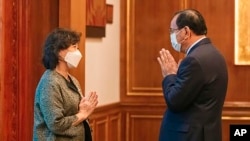The top U.N. envoy dealing with the crisis in Myanmar met Thursday with her counterpart from the Association of Southeast Asian Nations to discuss their joint efforts to promote peacemaking in the strife-torn nation.
Cambodia’s Foreign Affairs Ministry said Foreign Minister Prak Sokhonn briefed Noeleen Heyzer, the visiting special envoy on Myanmar for the U.N. secretary-general, about his recent mission to Myanmar in his capacity as ASEAN special envoy.
Prak Sokhonn described plans for a consultative meeting on humanitarian assistance for Myanmar in early May, the ministry said in a statement. Hundreds of thousands of people in Myanmar have been made homeless by army operations meant to quash opposition to military rule.
Myanmar has been under military rule since February 2021, when its army ousted the elected government of Aung San Suu Kyi. The takeover was met with massive resistance, which has since turned into what some U.N. experts have characterized as civil war.
The United Nations and ASEAN have sought diplomatic solutions to the crisis, but with little to show for their efforts. The U.N. is hamstrung by the ability of China and Russia, Myanmar’s top allies, to veto any serious coordinated action to restrain the generals.
ASEAN’s efforts have been virtually ignored by the military government, even though Myanmar belongs to the 10-member regional body.
ASEAN reached a five-point consensus on Myanmar last April. It called for the immediate cessation of violence, a dialogue among all concerned parties, mediation by an ASEAN special envoy, provision of humanitarian aid through ASEAN channels and a visit to Myanmar by the special envoy to meet all concerned parties.
Prak Sokhonn is currently ASEAN’s special envoy because Cambodia is the group’s chair this year. In January, Cambodian Prime Minister Hun Sen became the first head of government to visit Myanmar since the army seized power.
With no concessions offered by his Myanmar counterpart, Hun Sen expressed pessimism after his return that any progress toward peace could be made this year.
Prak Sokhonn said that during his own March 21-23 visit, he stressed “three urgent priorities, namely: making steps toward ending violence, facilitating the distribution of humanitarian assistance, and building trust and enabling environment.”
He also told Heyzer of the challenges he faces, saying the different political actors in Myanmar are not ready for talks and are still strongly determined to continue their struggles, especially through armed struggle, the ministry said. “It is obvious there is no quick fix to problems that are so deeply rooted in the country, in the society, in the mind of people,” it said.
Heyzer did not immediately comment on their meeting.







